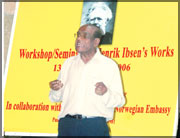|
DAILY NEWS ONLINE |
|
|
|
OTHER EDITIONS |
|
|
|
OTHER LINKS |
  |
|
Henrik Ibsen centenary Echoes from the Doll’s HouseNamel-Malini Punchi Theatre was packed to capacity recently with youngsters who were eager to learn drama and play acting and veterans, dramatists. They all had gathered for the two-day workshop on the Norwegian playwright Henrik Ibsen who is considered the world over as the founder of modern naturalistic drama. This year marks the 100th death anniversary of the great playwright.
Norwegian Ambassador Hans Baxter was the chief guest at the inauguration of the workshop. Iranganie Serasinghe, Prof. Ashley Halpe, Dr. Jayantha Dhanapala, Prof. Sunanda Mahendra, Dr. Ernest Macintyre, Dr. G. K. Hathotuwegama, and Ariyawansa Ranaweera were there to share their expertise and know-how with the workshop participants. From the start, it was a fine interaction of insights and views, blending with each other, or complementing each other, helping the participants adding to their knowledge on the master playwright and his work, and on the play-craft. The Ambassador complimented the organizers of the workshop. He was also pleased that a workshop in Sinhala was held a few weeks ago marking the centenary of the playwright. He said there was a lot of relevance in Ibsen’s plays to the world of today. Dr. Jayantha Dhanapala made the inaugural talk on Ibsen who was introduced to the audience by the conductor of the workshop proceedings. Dr. Ernest Macyntyre as a “very fine actor in the sense of the theatre” drew quite a comprehensive outline on the playwright. Many in the audience may not know that this fine diplomat of Sri Lanka was a clever actor in many plays during his student days at the University of Peradeniya, Dr. Dhanapala who has been to many parts of the world said Ibsen had made such an impact on the world drama that one of his plays is staged every evening at some place in the world, including Westend of London and Broadway in New York. Ibsen was not as much respectful of society as of the individual and his duty to society. He always overshadowed liberal democracy. Yet, he was conscious of the creative writer’s role in society. Through his plays he always questioned conventional wisdom and this is a great lesson for the young to learn from the master playwright. He is one of the foremost advocates of women’s freedom. His play The Doll’s House was a trumpet call for liberation of women. The speaker also added that we in Sri Lanka had taken women’s freedom for granted. Dr. Henry Jayasena taking an episode of the film as an example pointed out how difficult it would be to handle certain areas of Ibsen’s plays like the long dialogue between Nora and her husband just before Nora leaves home-the climax of the play. “Unless the cast is highly professional an Ibsen play will be an utter failure,” opined Prof. Sunanda Mahendra who has introduced three plays of Ibsen to Sinhala theatre. Where does the failure lie - is it in the text, when the Sinhala work of an English translation, the original of which is Norwegian or is it in the experience expressed in the play? Of Ibsen’s plays Doll’s House was the better known among the drama enthusiasts here. Even then, the experience was not correctly received or far-fetched was the consensus of the resource persons. Dr. Hathothuwegama, the pioneer of street drama in Sri Lanka, pointed out that dramatist Vijitha Gunaratne who has the knack of the Nordic language has done a better translation of Doll’s House. Nonetheless Prof. Halpe was somewhat wary about how a translation of an art work, especially a play be judged. According to him, translation occurs all the time in our minds, when we read a book, or when we watch a play or a movie. We perceive it according to our individual capacities; process of translation takes place there in our minds.” Dr. Dhanapala’s comprehensive introduction of the playwright seemed to have spurred up the audience for a lively interaction of views. And, a heartening and mentally invigorating exercise for the gathering, when events of this nature being few and far between today. Though many events take place from launching of new books, staging of new dramas, screening of new films to literary, drama and film festivals, they do not have much space in them to have a genuine discourse on any of the real issues concerned. Having programmes of this nature is fulfilling-a long neglected need of those who yearn for this kind of intellectual and aesthetic rejuvenation. .................................. |
|
|
|

